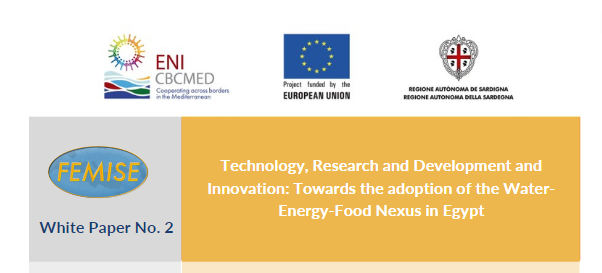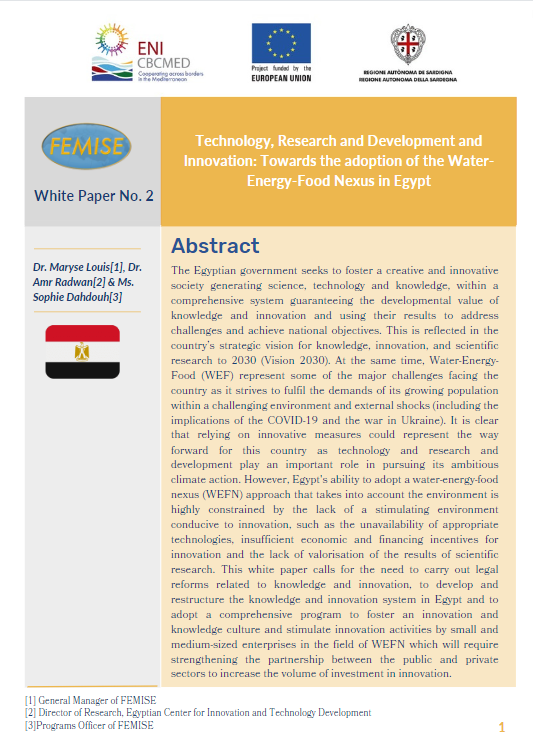
The Egyptian population is estimated to reach 116 million by 2040, according to UN population reports. This explains how the country is struggling to achieve water, energy and food security, key issues in achieving national security.
The annual freshwater resources available per capita have decreased to 570 cubic meters per year in 2018 and are expected to fall to 390 cubic meters per year by 2050. The productivity of two main crops in Egypt, namely wheat and maize, is expected to decline by 15% and 19%, respectively, by 2050. Even more, the country is the largest user of oil and natural gas in Africa, with an energy consumption growth rate of over 6% per year resulting in frequent power outages.
Egypt Vision 2030 and its roadmap represent a fundamental step in the country’s efforts towards sustainable and inclusive development aimed at eliminating poverty and ensuring prosperity for future generations. Despite recent efforts, Egypt is still facing numerous challenges when it comes to encouraging innovation and scientific research. Therefore, Egypt must redouble its efforts by persisting on the path of R&D and improving the legal framework of using natural resources and enhancing collaboration between the ministries.
Dig deep more in this white paper for more about how innovation and scientific research are the breakthrough in adopting the integrated Water-Energy-Food Nexus.
The second white paper, which is produced as part of the series of white papers undertaken in partnership between FEMISE, RSS, ANPE, CRES, UNICT, UAB and ECITD in the WEF-CAP project, is entitled: “Technology, Research and Development and Innovation: Towards the adoption of the Water-Energy-Food Nexus in Egypt” by Dr.Maryse Louis, and Ms.Sophie Dahdouh, experts in Mediterranean socio-economics at Femise and Amr Radwan, director of research at the Egyptian Center for Innovation and Technology Development (ECITD) in English and Arabic .
Summary
The Egyptian government seeks to foster a creative and innovative society generating science, technology and knowledge, within a comprehensive system guaranteeing the developmental value of knowledge and innovation and using their results to address challenges and achieve national objectives. This is reflected in the country’s strategic vision for knowledge,
 innovation, and scientific research to 2030 (Vision 2030). At the same time, Water-Energy-Food (WEF) represent some of the major challenges facing the country as it strives to fulfil the demands of its growing population within a challenging environment and external shocks (including the implications of the COVID-19 and the war in Ukraine). It is clear that relying on innovative measures could represent the way forward for this country as technology and research and development play an important role in pursuing its ambitious climate action. However, Egypt’s ability to adopt a water-energy-food nexus (WEFN) approach that takes into account the environment is highly constrained by the lack of a stimulating environment conducive to innovation, such as the unavailability of appropriate technologies, insufficient economic and financing incentives for innovation and the lack of valorisation of the results of scientific research. This white paper calls for the need to carry out legal reforms related to knowledge and innovation, to develop and restructure the knowledge and innovation system in Egypt and to adopt a comprehensive program to foster an innovation and knowledge culture and stimulate innovation activities by small and medium-sized enterprises in the field of WEFN which will require strengthening the partnership between the public and private sectors to increase the volume of investment in innovation.
innovation, and scientific research to 2030 (Vision 2030). At the same time, Water-Energy-Food (WEF) represent some of the major challenges facing the country as it strives to fulfil the demands of its growing population within a challenging environment and external shocks (including the implications of the COVID-19 and the war in Ukraine). It is clear that relying on innovative measures could represent the way forward for this country as technology and research and development play an important role in pursuing its ambitious climate action. However, Egypt’s ability to adopt a water-energy-food nexus (WEFN) approach that takes into account the environment is highly constrained by the lack of a stimulating environment conducive to innovation, such as the unavailability of appropriate technologies, insufficient economic and financing incentives for innovation and the lack of valorisation of the results of scientific research. This white paper calls for the need to carry out legal reforms related to knowledge and innovation, to develop and restructure the knowledge and innovation system in Egypt and to adopt a comprehensive program to foster an innovation and knowledge culture and stimulate innovation activities by small and medium-sized enterprises in the field of WEFN which will require strengthening the partnership between the public and private sectors to increase the volume of investment in innovation.
Structure of the White Paper:
- Introduction
- Strategic Vision for Knowledge, Innovation, and Scientific Research to 2030
- Challenges facing the Water-Energy-Food sectors in Egypt
- Egypt’s Vision 2030: The country’s national initiatives and programs
- The adoption of a WEF Nexus Approach in Egypt: Challenges and Opportunities
- Conclusion & recommendations
WEF-CAP PROJECT
https://enicbcmed.eu/projects/wef-cap
Twitter: @WefCap
Facebook: Wef-Cap Project
Copyright notice: Copyright © WEF-CAP.
WEF-CAP (THE TECHNOLOGY TRANSFER AND CAPITALIZATION OF WATER ENERGY FOOD NEXUS) is a project part of the ENI CBC MED Programme supported by the European Union through the Grant Agreement nº C_A.2.1_0069 running from 1st of September 2021 to 31th of August 2023.
This document is provided by the copyright holders and contributors « as is » and any express or implied warranties, including, but not limited to, the implied warranties of merchantability and fitness for a particular purpose are disclaimed. In no event shall the copyright owner or contributors be liable for any direct, indirect, incidental, special, exemplary, or consequential damages (including, but not limited to, procurement of substitute goods or services; loss of use, data, or profits; or business interruption) however caused and on any theory of liability, whether in contract, strict liability, or tort (including negligence or otherwise) arising in any way out of the use of this document, even if advised of the possibility of such damage. The ENI CBC MED Programme is not liable for any use that may be made of the information contained therein.


